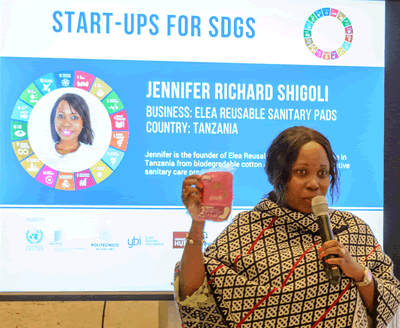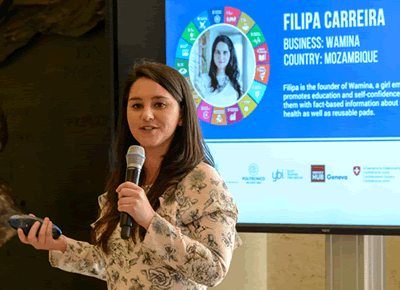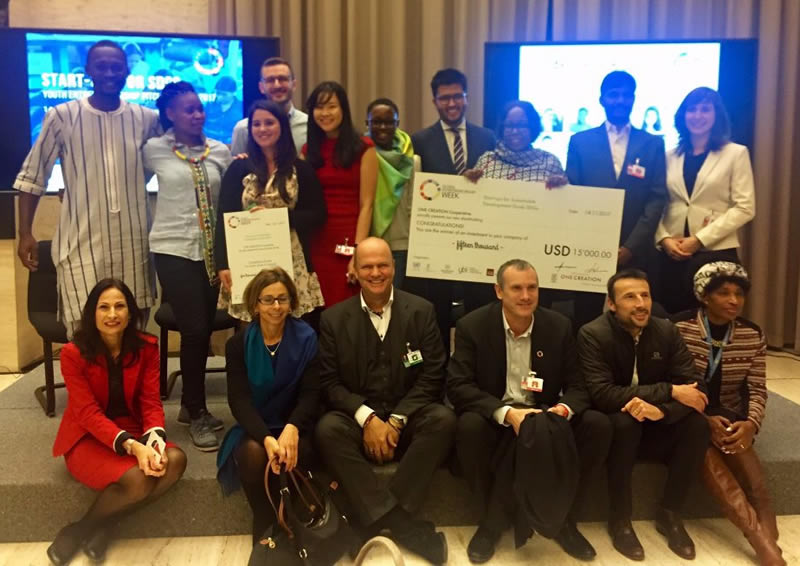Organized as part of this year's Global Entrepreneurship Week, the "Start-ups for SDGs" event gave 10 young entrepreneurs from around the world a chance to pitch their business ideas to a panel of impact investors that included Business Angels Switzerland, Lombard Odier, NEUW Ventures, and One Creation, the Geneva-based cooperative company that sponsored the event and provided the prize money.
Winner Jennifer Shigoli quit the corporate world in 2013 to create Elea Pads after she saw that young girls were frequently absent from school during menstruation because they couldn't afford disposable sanitary pads.
The business idea came to the 29-year-old former legal officer while she was teaching hygiene and sanitation in primary schools in Nyang'oro in rural Tanzania.
"I did some research and saw that the problem was huge," Jennifer said. "On top of the fact that they missed school, the materials they used were unhygienic. Some were using rags, old newspapers, chicken feathers, leaves."

"I thought there must be a solution, a way to give them an affordable alternative."
Jennifer is a graduate from Empretec, UNCTAD's entrepreneurship training program, and quickly realized while designing the pads that affordability was only one part of the story. For Elea Pads to be a sustainable solution, they would need to be environmentally friendly and locally produced.
"I'm very proud to say that our products use only biodegradable cotton and that every pad is made by women in Tanzania," she said.
Speaking after winning the top prize, Jennifer said she had learned so much from the other nine finalists.
"We're all coming from different parts of the world and it's made me start thinking globally, because this is not just a Tanzanian problem."

In fact, the runner-up prize of US$5,000 went to Wamina from Mozambique, a start-up teaching girls and women menstrual health and hygiene that also aims to produce low-cost, reusable sanitary pads.
"For many businesses US$5,000 may not be a lot of money. But for us it is," Wamina founder Felipa Carreira said.
"This will enable me to start in-country production of the pads, which has been the objective since the beginning of the year. So for me it's a big win."
The finalists, selected among more than 100 applicants, were scored on the quality of their presentations, and the link between the products or services they provide and the Sustainable Development Goals (SDGs) - the global development package adopted in 2015 by the international community.
"It becomes increasing clear, thanks to events such as this one, that solving social and environmental problems can generate a revenue and be turned into financially sustainable businesses," Swiss Confederation Minister and Deputy Permanent Representative Roman Busch said at the awards ceremony.
"The private sector has a crucial role to play in the achievement of the SDGs. And the states and the international community ought to facilitate it," Mr. Busch added.
The eight other finalists were:
Aurélia Bernard, one of the founders of Epi'Coop, a Geneva cooperative selling local products that provides employment for migrants to Switzerland
Christian Toe, project promoter for the Laafi Bag, a solar-powered thermo-regulated backpack designed to safely carry medicines and vaccines to remote locations in Burkina Faso
Emily Chin, co-founder of 1b Global, a Singapore-based renewable energy utility provider offering underserved communities in Asia pay-as-you-go services
Guillermo Jarrin, founder of TippyTea Blends, a fair-trade company working with indigenous women in Ecuador and using locally grown organic herbs and fruits to produce specialist loose-leaf tea blends
Monique Ntumngia, founder and CEO of Monafrik Energy, which trains girls in rural Cameroon how to generate renewable energy from sun and waste
Noma Ngubane, founder of Nomashi Solutions, which provides affordable breast and cancer screening services in South Africa thanks to its mobile X-ray and mammogram trucks
Sadashiv Mhaskale, founder of Disha Sunlight, a company that provides solar energy solutions, such as solar LED street lights, for tribal areas and remote villages in India
Umberto Manazza, one of the founders of pioNIRS, an Italian-based portable medical devices start-up specializing in non-invasive brain oxygenation procedures to prevent death and disabilities in premature babies

The "Start-ups for SDGs" event was jointly organized by UNCTAD, the World Intellectual Property Organization, Politecnico Milano, Youth Business International and Impact Hub Geneva.
"We believe that entrepreneurs are part of the solution," UNCTAD's chief of its Entrepreneurship section Fiorina Mugione said. "The Sustainable Development Goals are for each and every one of us, not just the policymakers and the international organizations."
"Start-ups have taken the challenge because where we see a problem, they see an opportunity," Ms. Mugione added.


